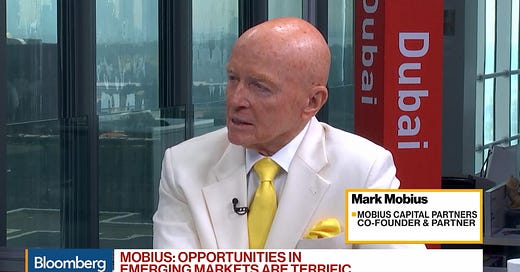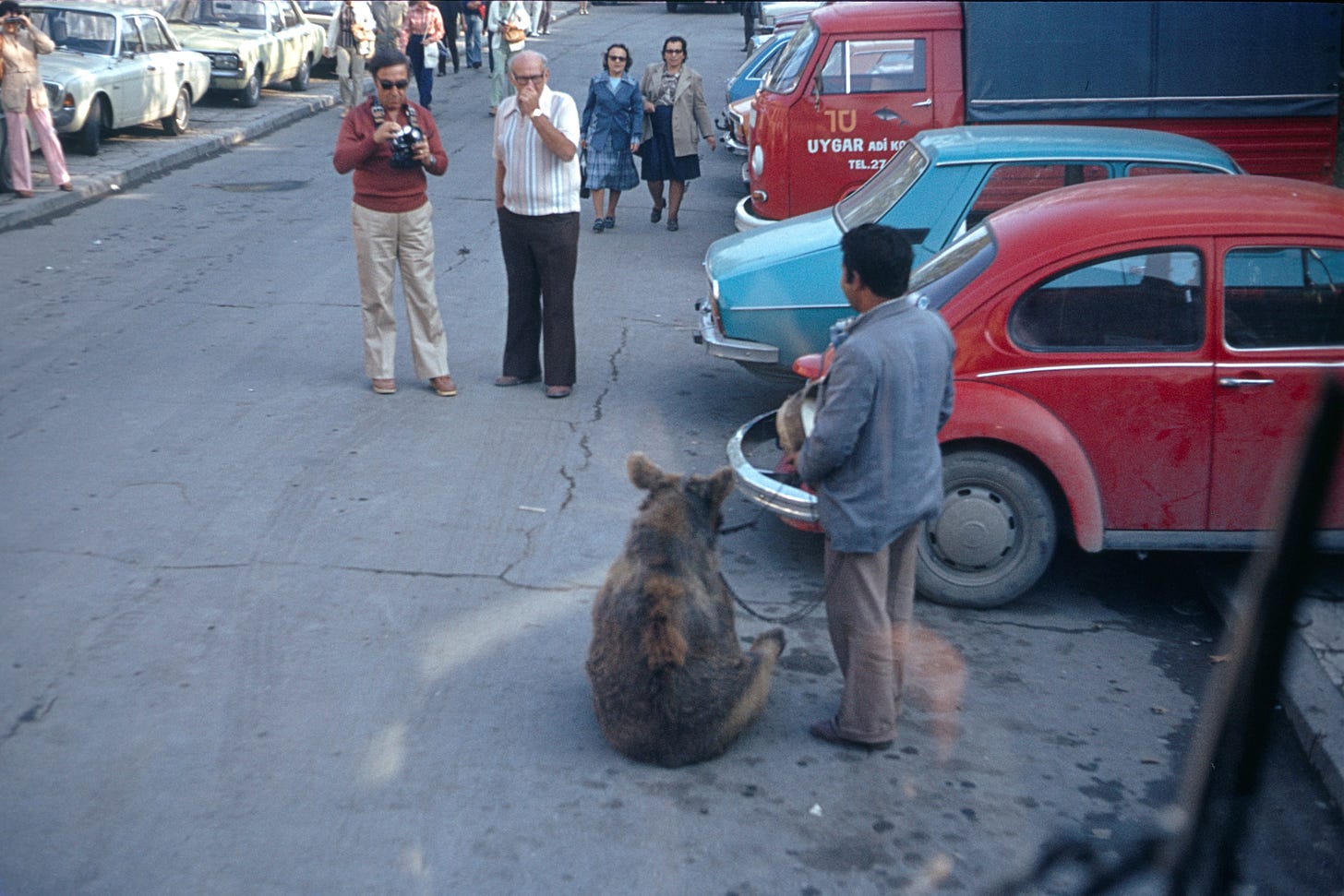The Michael Jordan of Emerging Markets Investing: A Conversation with Mark Mobius
The legendary investor talks investment philosophy, how he got started, advice to students and aspiring pros, favorite airlines, and why he's bullish on EM but bearish on crypto 'religion'
By Afshin Molavi
Emerging World Interview
If emerging markets investing had a hall of fame, Mark Mobius would be a first ballot, unanimous entry. The trouble is that most sports hall of fames only induct you after retirement, but the legendary investor is still going strong, at age 85, after a highlight-filled career. Imagine Michael Jordan still at the top of his game today.
After a three decade-plus career at the helm of the vaunted Franklin Templeton series of emerging markets funds, Mobius launched his own fund in 2018 - Mobius Capital Partners. From that perch, Mobius still sits astride the emerging markets universe, a highly sought-after voice on Bloomberg or CNBC, and still something of a cult figure in Asia (how many EM fund managers have their own comic book?)
In an exclusive for Emerging World, we spoke with Mobius over Zoom (he in Dubai, EW in Washington) and we talked about:
his early days as a “wandering student”
his formative work experiences in Asia, including a stint selling Snoopy and Peanuts products
Mobius’ three criteria for investing in companies
the early days of EM investing: “there were only 6 markets we could invest in”
his investing philosophy: don’t invest in companies with no earnings and avoid the Index darlings
favorite airlines: Emirates Airline #1 with Singapore and Turkish Airlines a close second, with ‘great disappointment’ in US carriers
his advice to students and aspiring EM investment professionals: travel, travel, travel, and read, read, read.
and his views on Crypto (“Crypto is like a religion. You can’t really debate it”)
and a lot more
Strikingly, Mobius told me that in the late 1970s, more than a decade after completing his Ph.D at M.I.T. in economics and political science, he was a stock market novice. In fact, while living in Hong Kong in the 1970s leading a research consultancy, he admitted: “I knew nothing about stock markets at the time.” His is not the Warren Buffet-ian story of the boy who pored over the Wall Street Journal as a kid. It is more of the “wandering student” who wanted to see the world, and fell in love with emerging markets investing – and jumped deep into the waters.
Over the years, he has been called ‘the Godfather of Emerging Markets,’ the “Indiana Jones of Emerging Markets,’ and the ‘Pied Piper of Emerging Markets.’
We start from his days as a “wandering student.”
The below are Mobius’ own words, lightly edited and condensed.
From Wandering Student to Asia Research Analyst
After I graduated from Boston University with a Bachelor of Fine Arts degree (1957), I continued my studies in various places. I became a wandering student getting scholarships at different places. One day, I saw the opportunity to get a scholarship to study in Japan. I went to Japan and was under the auspices of Kyoto University there. And that opened my eyes to a whole new world.
It was kind of a culture shock that I experienced in Japan. I said to myself, this is where I want to work. I want to be back in Japan. And of course, at that time, that was in 1962, Japan would have probably been considered an emerging market. Then I had a short stint in New Mexico as a teaching assistant. And then went to MIT, and graduated from MIT in 1964, with a PhD.
While at MIT, the emphasis of the economists that I was studying with was on economic growth. They were trying to answer the question, ‘why do countries not grow?’ I mean, ‘what causes countries to be poor?’ And they had all kinds of theories. And so that sort of stuck in my mind, especially since the emerging markets story over the past few decades has been all about growth.
So, after MIT, I set off for Japan and started working for a research company, doing all sorts of research on Asian markets. But I didn’t really do anything on equities or stock markets until more than a decade later.
Selling Snoopy in Asia and a Breakthrough Moment in Hong Kong - 1970s
(Hong Kong, 1974. Credit: atlantic-kid, via iStock)
With my new research company, I traveled to India, Thailand, you name it. I did work for Volvo and for all kinds of companies looking to market in Asia. One of my clients turned out to be a company based in San Francisco called Determined Productions. They had the rights to all of the Peanuts merchandise - Charlie Brown, Snoopy and like.
It was a multi-million dollar business for them and they came to me and said; ‘We’re looking for manufacturers in Asia.’ So I did research on finding manufacturers. And then one day I said, ‘you know, why don't you sell your Snoopy products in Asia?’ So, we got involved in selling Snoopy and other products in Asia. This was around 1977. This business became so big that my Chinese staff was running it.
Around the same time, I got a request to do an analysis of the stock market in Hong Kong. I knew nothing about stock markets, really. But I did a technical analysis, which turned to be quite prescient, because I predicted the bear market that took place in Hong Kong.
So I got interested in stock markets and I began working for a British brokerage in Hong Kong and I gave the Snoopy business to my Chinese staff.
From Hong Kong Analyst to Taiwan Director to Templeton Emerging Markets: 1970s-80s
(Hong Kong, 1974. Credit: atlantic-kid, via iStock)
The Hong Kong job was very exciting because I was exposed to the whole market. I was doing all kinds of research. The brokerage was a shareholder in a company called International Investment Trust, which was the first investment management company in Taiwan and when they were looking for a new director, they sent me there.
By 1985, I had become President of International Investment Trust, the Taiwan-based company. Then I got a call from John Templeton. He said:
‘Look, we, we have a new fund called the emerging markets fund, we're going to float in New York, would you like to manage it?’ I had got to know him over the years and had visited with him in the Bahamas for work.
It was a difficult decision for me because I was living a very nice life in Taiwan, with a car and driver and a very easy office life. But then I said, ‘Gee, you know, I really want to do something globally.’ And so I joined this idea of a new fund. At that time, it was interesting that the International Finance Corporation had also come up with the idea of emerging markets - the name coined by Antoine von Agtmael (For more on the origin of the term “emerging markets” and the man who coined that term, see our column - ‘The Invention of ‘Emerging Markets’)
Where to Invest? The Early Days, the Late 1980s
I then started looking at these emerging markets, because at that time, the definition of an emerging market was all the low and middle income countries, as defined by the World Bank, on a per capita basis. And of course, that included all of Africa, of course, all of Latin America, all of Asia, with the exception of Japan, Australia, New Zealand. In those days, Eastern Europe was still behind the Iron Curtain. Russia was out. China was out, of course. But then we started saying, ‘Okay, we've got $100 million, where do we invest?’ And we discovered that we could only invest in about six countries because all of these other countries were closed for one reason or another.
In those days, there remained this whole idea of government ownership of all the industries, across socialist countries and, of course communist countries. And If you looked at Latin America, it was primarily dictatorships and socialist countries or those beginning to be socialist countries. So we had a real difficult time finding companies in which to invest.
How To Invest: The Early Days
Those early days were difficult because we'd want to invest in countries, but we needed a custodial bank to invest and most of the banks said: ‘oh, no, we're not going into South Africa, or Argentina, or wherever.’ They said: ‘it's too dangerous, blah, blah, blah, we can't guarantee safety of the securities.’
Then, in 1993, the Franklin organization came along and bought Templeton. So that gave us an incredible boost because Franklin was a real marketing organization. And we started building up assets very rapidly and added a number of funds. And within 10 years, we had $60 billion under management, and about 50 different funds.
So we had to fight, and thank God, Franklin Templeton was so big that we could sort of twist the arms of these banks, but it was a hell of a job to get them to accept the idea of being the custodian for shares that were sitting somewhere in India or in Thailand or wherever. In that respect, I think we made a big contribution to the business by breaking the mold.
Pitching Emerging Markets to Retail Investors
Our pitch which was very straightforward. It was growth, it was all about growth. And by the way, it’s still the same today. Emerging markets at that time were growing at more than double that of developed countries. And that's still the case today. Despite all of the problems you hear about, the average growth rate is higher, almost double that of the developed countries. So that was the pitch. The pitch was growth. And it turned out to be right. In other words, the performance was very, very good.
We were also able to convince a lot of people to go into these markets because institutional investors in America and even individual investors were sort of tied up with only American stocks. They wanted to go global because they had already dipped their toe into Europe and Japan. But they wanted to go further afield because their experience in Japan and Europe had been fairly good. They saw that it wasn't such a dangerous thing to do, you know. And so that's how things began to move in these emerging markets. It was really about the growth. The growth promise, let's put it that way.
Emerging or Emerged?…and ‘American Emerging Market Companies’
The interesting thing now is that these emerging markets have emerged, in many cases. A country like South Korea, on a per capita basis is no longer in the low and middle income bracket. That's number one.
But more importantly, the earnings of American companies and British companies are now becoming more and more heavily weighted towards emerging markets. So the question you must ask is: what is an emerging market company? Because if a company has over 50% of their earnings, or their manufacturing in emerging markets, aren't they an emerging market company?
So this is the kind of problem we have, because the American market and some of the developed markets, London, so forth, are really benefiting from the growth of emerging markets, and are not totally dependent on developed markets for their growth.
The Rise of Emerging Markets ETFs and Avoiding the “Index Fixation”
Over the last ten years, the whole exchange traded funds have exploded – ETFs. And what happened is that, I would reckon I would say that perhaps half of all emerging markets investing, equity investing, is indexed either direct ETFs index funds or just big organizations indexing their portfolios.
They say they're active managers, but actually, they're indexing. So when you have that situation, then you have a real problem because you've got an index, which is heavily weighted to China. And when you have that one country with 30% of the index weighting, going down, which has recently been the case, the whole index goes down and people lose faith, and they say: ‘Oh, God, emerging markets are over.’ But they fail to recognize that the Indian market is going through the roof, for example.
Despite the fact that the emerging markets index has gone down, our portfolio last year has gone up by 40%, because we're in India and in Taiwan and just a little bit in China. We're running up against this index fixation. There is also a lack of realization that, as I said, many of the developed market companies are actually being transformed into emerging market companies.
“Emerging Markets Growth is Not Over. Not by a Long Shot.”
The rapid growth is not over. India is growing 6/7%. Even China with all of its difficulties is growing something like 4 or 5%. And then you have a whole new swathe of so-called frontier country companies that are starting from extremely low base that will be growing in some cases by double digits. So the emerging markets growth story is certainly not over. Not by a long shot.
If you look at our portfolio, India and Taiwan are the big ones. Those are the countries that we have the biggest portion of our portfolio, then we have a little bit in China, we have a little bit in South Africa, in Turkey, in Brazil, in Vietnam. So you know, we've diversified globally.
But it's not really that we sit down and say, ‘oh, we like Taiwan, or we like India.’ What we do is we scan all the companies around the world in emerging markets, and select those that meet our criteria. We're agnostic in terms of sector. We're not clinically negative on any particular sector. So it's all driven by the criteria that we have that we use to select companies.
The Three Criteria Mobius Looks for in Investing in Companies
We’re not really interested in these companies with no earnings that list and then go through the roof. I always tell my analysts to keep your head in the clouds and your feet on the ground. You can be very creative and ambitious to find new companies, but we want companies that have a good return on assets. Companies that have growth in earnings per share. And companies that have a low debt to equity ratio. Those are the three criteria. And there are many companies in that categorization.
We try to avoid companies that are in any index. We want to have companies that are not in indexes. And that leads us to medium and small sized companies.
I don't like to look at a company unless it has at least a 20% return on assets. Now, if you find companies like that, you'll find that they have no debt. And it makes sense, because they're returning so much on their assets. They don't need to borrow money. Those three criteria are the first step in the process.
The next step is to call the company and visit them and talk to the management. We ask questions: how do they business and so forth? What is their ESG like? In other words, are they interested in improving the impact of their company on the environment? On the social environment? And on governance? Do you have any independent directors on your board? Do you have any women on your board?
And we then ask them: are you willing to work with us to improve your ESG? If they express the feeling that they're not, then we don't invest. So any company in which we invest, we want to engage with you. In other words, we want to have an active dialogue with the company on a regular basis
Whither China Equities?
There are many challenges facing people who invest in China now. First and foremost, the tension between the US and China and the threat by the Chinese authorities to delist the many Chinese companies listed in the US. So that's something that anybody looking at China will be very frightened about.
The Chinese government has now finally begun to crack down on monopolistic practices by the big companies like Alibaba, which I personally think is a good thing. But investors in these companies don't like it. They don't think it's a good thing. Because the stock prices have been hammered and they've been going down. And by the way, that's one of the reasons why the Chinese indexes performed so poorly because the weighting of these big companies is so large in the index.
I personally think the Chinese government efforts to impose better rules and regulations regarding not only monopolistic practices, but corporate governance in general is probably a very good thing. And by the way, it is in line with what the Americans did and have been doing for many years now. You know, they've always been watching these companies and saying, ‘Look, Rockefeller, you cannot control the oil industry in America, or Carnegie, you can't control the steel industry in America.’ So now China is sort of going through this to some extent, at least as regards to the technology companies.
“I Have Great Hopes for India”
I like to call India the United States of India because the states are quite separate from each other. A lot of people are surprised to learn that the languages between states are different, both written and spoken, but the good news is that these states are coming together closer, as you know.
The tax reform in India has really done a tremendous job of making it easier to transport goods from one state to another. So this reform process is having an incredible impact.
As soon as you free up these countries, the the growth rate tends to accelerate. And India is just at the beginning of this process. So I have great hopes for India. Not only because of that, but also because the incredible diversity of culture in India is a big plus, as far as I'm concerned. You generate an incredible creativity of ideas, which is probably why India is so good on software technology.
As you know, they're a big exporter of software around the world. So I'm very optimistic about India. There will be problems of course, along the way. There will be bumps. But generally speaking, the reform movement is going to have a very beneficial effect.
Turkish Companies Are “Survivors”
You've got real problems in Turkey with the currency volatility. But I've been investing in Turkey for a long time, maybe about 20 years, and we've been through all kinds of problems. But one thing about Turks and Turkish companies is that they're survivors. They know how to maneuver around these problems and continue to grow. So I think they'll come through, but there'll be difficulties along the way.
The good news for us is that we're in companies that benefit from a cheaper lira, because they're exporting some of their products and so forth.
Why Dubai?
I normally would be living in Singapore, traveling most of the time. But then the Singapore government locked the country up. I couldn't return because if I returned, I'd be locked up for two weeks. And then if I went outside and came back again, it'd be another two weeks. It just was not practical. So I’ve been in Dubai for almost a year now. It's almost going on another year. And luckily, as I mentioned, I bought two apartments here many years ago. So I'm living in one and renting the other.
It has been tremendous because the great thing about Dubai is that, okay, you have to wear masks, but you can travel, you can go out, you're not restricted.
So, while I’ve been here, I've traveled to Egypt, to Turkey, Italy, and Cyprus.
“Crypto is a religion.”
“I always tell people crypto is a religion. You cannot talk to people and tell them ‘oh, crypto is a Ponzi scheme or whatever.’ So you got to accept it for what it is. They're having a lot of fun. Some people are making money on this just like any kind of scheme like this, there will be winners and losers. But I don't think it's a viable system to invest. It just does not make sense. Just blockchain alone does not make sense to me.”
“People say, well, Blockchain is safe. Why? Why do they think it's safe? Oh, they say that can't be hacked. I don't believe it can't be hacked, it can be hacked. It's already been done. So, you know, they get into these ideas, and they're fixed ideas that they will not accept if anybody challenges them. So I don't think it's going to end in a happy way. Let's put it that way.”
Favorite Airlines and Hotels
“I would say Emirates Airline is my favorite at this stage. Singapore is up there as well. But you know, I think Emirates really has done quite an incredible job. After that, maybe Turkish airlines. I’m really disappointed by the American airlines. The US airlines have very bad terms of service.
In terms of hotels, I tend to stick to the chain hotels, you know, the Marriott chain, the Sheraton. You name itL any chain hotel, because this way you know what to expect, right. I also need a gym in my hotel.
I go to the gym every morning. People say I don't have time to read or exercise. I say do both at the same time. I get on a stationary bicycle and read while I'm cycling. That's a good way to save time. You know, you get your reading done and also have exercise.
Advice to Students and Aspiring Professionals: Travel and Read. Repeat.
Well, the first thing is to get out and travel. Try to travel, take a year, two years, and really go into these countries, and learn about the cultures, get to know people. And you must realize that people around the world are very eager to meet young people who are interested in their culture. (Read Our EW Column - “Why Travel Matters”)
So it's a great opportunity when you're young, to get out and do that. And after that, of course, read, read, read, study, study, study, be open minded, and be willing to accept new ideas, don't get into any political straitjacket, so to speak, which I guess is difficult to do in the US now. But generally speaking, try to keep an open mind. And at the end of the day, if they do that, they should do quite well, there should be lots of opportunity.
For more on Mark Mobius, you can check out his website here, or read his latest book, “The Inflation Myth and the Wonderful World of Deflation.”
And….see below…
P.S - I loved scrolling through some Hong Kong “nostalgia” photos for this article and I thought I’d share a couple more “nostalgia” photos below, one from Cairo, and another from Istanbul with a bear-tamer! Cheers, Afshin
CAIRO - 1977
(Cairo, 1977. Credit: atlantic-kid via iStock)
(Istanbul, 1979. Credit: atlantic-kid via iStock)













Great article! Keep up the good work!
Thanks for a great read!